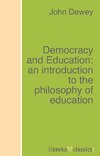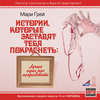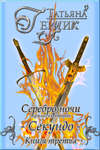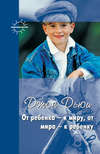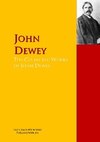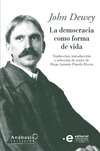Читать книгу: «Democracy and Education: an introduction to the philosophy of education», страница 5
Habits reduce themselves to routine ways of acting, or degenerate into ways of action to which we are enslaved just in the degree in which intelligence is disconnected from them. Routine habits are unthinking habits: "bad" habits are habits so severed from reason that they are opposed to the conclusions of conscious deliberation and decision. As we have seen, the acquiring of habits is due to an original plasticity of our natures: to our ability to vary responses till we find an appropriate and efficient way of acting. Routine habits, and habits that possess us instead of our possessing them, are habits which put an end to plasticity. They mark the close of power to vary. There can be no doubt of the tendency of organic plasticity, of the physiological basis, to lessen with growing years. The instinctively mobile and eagerly varying action of childhood, the love of new stimuli and new developments, too easily passes into a "settling down," which means aversion to change and a resting on past achievements. Only an environment which secures the full use of intelligence in the process of forming habits can counteract this tendency. Of course, the same hardening of the organic conditions affects the physiological structures which are involved in thinking. But this fact only indicates the need of persistent care to see to it that the function of intelligence is invoked to its maximum possibility. The short-sighted method which falls back on mechanical routine and repetition to secure external efficiency of habit, motor skill without accompanying thought, marks a deliberate closing in of surroundings upon growth.
3. The Educational Bearings of the Conception of Development. We have had so far but little to say in this chapter about education. We have been occupied with the conditions and implications of growth. If our conclusions are justified, they carry with them, however, definite educational consequences. When it is said that education is development, everything depends upon how development is conceived. Our net conclusion is that life is development, and that developing, growing, is life. Translated into its educational equivalents, that means (i) that the educational process has no end beyond itself; it is its own end; and that (ii) the educational process is one of continual reorganizing, reconstructing, transforming.
1. Development when it is interpreted in comparative terms, that is, with respect to the special traits of child and adult life, means the direction of power into special channels: the formation of habits involving executive skill, definiteness of interest, and specific objects of observation and thought. But the comparative view is not final. The child has specific powers; to ignore that fact is to stunt or distort the organs upon which his growth depends. The adult uses his powers to transform his environment, thereby occasioning new stimuli which redirect his powers and keep them developing. Ignoring this fact means arrested development, a passive accommodation. Normal child and normal adult alike, in other words, are engaged in growing. The difference between them is not the difference between growth and no growth, but between the modes of growth appropriate to different conditions. With respect to the development of powers devoted to coping with specific scientific and economic problems we may say the child should be growing in manhood. With respect to sympathetic curiosity, unbiased responsiveness, and openness of mind, we may say that the adult should be growing in childlikeness. One statement is as true as the other.
Three ideas which have been criticized, namely, the merely privative nature of immaturity, static adjustment to a fixed environment, and rigidity of habit, are all connected with a false idea of growth or development, – that it is a movement toward a fixed goal. Growth is regarded as having an end, instead of being an end. The educational counterparts of the three fallacious ideas are first, failure to take account of the instinctive or native powers of the young; secondly, failure to develop initiative in coping with novel situations; thirdly, an undue emphasis upon drill and other devices which secure automatic skill at the expense of personal perception. In all cases, the adult environment is accepted as a standard for the child. He is to be brought up to it.
Natural instincts are either disregarded or treated as nuisances – as obnoxious traits to be suppressed, or at all events to be brought into conformity with external standards. Since conformity is the aim, what is distinctively individual in a young person is brushed aside, or regarded as a source of mischief or anarchy. Conformity is made equivalent to uniformity. Consequently, there are induced lack of interest in the novel, aversion to progress, and dread of the uncertain and the unknown. Since the end of growth is outside of and beyond the process of growing, external agents have to be resorted to to induce movement toward it. Whenever a method of education is stigmatized as mechanical, we may be sure that external pressure is brought to bear to reach an external end.
2. Since in reality there is nothing to which growth is relative save more growth, there is nothing to which education is subordinate save more education. It is a commonplace to say that education should not cease when one leaves school. The point of this commonplace is that the purpose of school education is to insure the continuance of education by organizing the powers that insure growth. The inclination to learn from life itself and to make the conditions of life such that all will learn in the process of living is the finest product of schooling.
When we abandon the attempt to define immaturity by means of fixed comparison with adult accomplishments, we are compelled to give up thinking of it as denoting lack of desired traits. Abandoning this notion, we are also forced to surrender our habit of thinking of instruction as a method of supplying this lack by pouring knowledge into a mental and moral hole which awaits filling. Since life means growth, a living creature lives as truly and positively at one stage as at another, with the same intrinsic fullness and the same absolute claims. Hence education means the enterprise of supplying the conditions which insure growth, or adequacy of life, irrespective of age. We first look with impatience upon immaturity, regarding it as something to be got over as rapidly as possible. Then the adult formed by such educative methods looks back with impatient regret upon childhood and youth as a scene of lost opportunities and wasted powers. This ironical situation will endure till it is recognized that living has its own intrinsic quality and that the business of education is with that quality. Realization that life is growth protects us from that so-called idealizing of childhood which in effect is nothing but lazy indulgence. Life is not to be identified with every superficial act and interest. Even though it is not always easy to tell whether what appears to be mere surface fooling is a sign of some nascent as yet untrained power, we must remember that manifestations are not to be accepted as ends in themselves. They are signs of possible growth. They are to be turned into means of development, of carrying power forward, not indulged or cultivated for their own sake. Excessive attention to surface phenomena (even in the way of rebuke as well as of encouragement) may lead to their fixation and thus to arrested development. What impulses are moving toward, not what they have been, is the important thing for parent and teacher. The true principle of respect for immaturity cannot be better put than in the words of Emerson: "Respect the child. Be not too much his parent. Trespass not on his solitude. But I hear the outcry which replies to this suggestion: Would you verily throw up the reins of public and private discipline; would you leave the young child to the mad career of his own passions and whimsies, and call this anarchy a respect for the child's nature? I answer, – Respect the child, respect him to the end, but also respect yourself…. The two points in a boy's training are, to keep his naturel and train off all but that; to keep his naturel, but stop off his uproar, fooling, and horseplay; keep his nature and arm it with knowledge in the very direction in which it points." And as Emerson goes on to show this reverence for childhood and youth instead of opening up an easy and easy-going path to the instructors, "involves at once, immense claims on the time, the thought, on the life of the teacher. It requires time, use, insight, event, all the great lessons and assistances of God; and only to think of using it implies character and profoundness."
Summary. Power to grow depends upon need for others and plasticity
Both of these conditions are at their height in childhood and youth. Plasticity or the power to learn from experience means the formation of habits. Habits give control over the environment, power to utilize it for human purposes. Habits take the form both of habituation, or a general and persistent balance of organic activities with the surroundings, and of active capacities to readjust activity to meet new conditions. The former furnishes the background of growth; the latter constitute growing. Active habits involve thought, invention, and initiative in applying capacities to new aims. They are opposed to routine which marks an arrest of growth. Since growth is the characteristic of life, education is all one with growing; it has no end beyond itself. The criterion of the value of school education is the extent in which it creates a desire for continued growth and supplies means for making the desire effective in fact.
1 Intimations of its significance are found in a number of writers, but John Fiske, in his Excursions of an Evolutionist, is accredited with its first systematic exposition.
2 This conception is, of course, a logical correlate of the conceptions of the external relation of stimulus and response, considered in the last chapter, and of the negative conceptions of immaturity and plasticity noted in this chapter.
Chapter Five: Preparation, Unfolding, and Formal Discipline
1. Education as Preparation. We have laid it down that the educative process is a continuous process of growth, having as its aim at every stage an added capacity of growth. This conception contrasts sharply with other ideas which have influenced practice. By making the contrast explicit, the meaning of the conception will be brought more clearly to light. The first contrast is with the idea that education is a process of preparation or getting ready. What is to be prepared for is, of course, the responsibilities and privileges of adult life. Children are not regarded as social members in full and regular standing. They are looked upon as candidates; they are placed on the waiting list. The conception is only carried a little farther when the life of adults is considered as not having meaning on its own account, but as a preparatory probation for "another life." The idea is but another form of the notion of the negative and privative character of growth already criticized; hence we shall not repeat the criticisms, but pass on to the evil consequences which flow from putting education on this basis. In the first place, it involves loss of impetus. Motive power is not utilized. Children proverbially live in the present; that is not only a fact not to be evaded, but it is an excellence. The future just as future lacks urgency and body. To get ready for something, one knows not what nor why, is to throw away the leverage that exists, and to seek for motive power in a vague chance. Under such circumstances, there is, in the second place, a premium put on shilly-shallying and procrastination. The future prepared for is a long way off; plenty of time will intervene before it becomes a present. Why be in a hurry about getting ready for it? The temptation to postpone is much increased because the present offers so many wonderful opportunities and proffers such invitations to adventure. Naturally attention and energy go to them; education accrues naturally as an outcome, but a lesser education than if the full stress of effort had been put upon making conditions as educative as possible. A third undesirable result is the substitution of a conventional average standard of expectation and requirement for a standard which concerns the specific powers of the individual under instruction. For a severe and definite judgment based upon the strong and weak points of the individual is substituted a vague and wavering opinion concerning what youth may be expected, upon the average, to become in some more or less remote future; say, at the end of the year, when promotions are to take place, or by the time they are ready to go to college or to enter upon what, in contrast with the probationary stage, is regarded as the serious business of life. It is impossible to overestimate the loss which results from the deflection of attention from the strategic point to a comparatively unproductive point. It fails most just where it thinks it is succeeding – in getting a preparation for the future.
Finally, the principle of preparation makes necessary recourse on a large scale to the use of adventitious motives of pleasure and pain. The future having no stimulating and directing power when severed from the possibilities of the present, something must be hitched on to it to make it work. Promises of reward and threats of pain are employed. Healthy work, done for present reasons and as a factor in living, is largely unconscious. The stimulus resides in the situation with which one is actually confronted. But when this situation is ignored, pupils have to be told that if they do not follow the prescribed course penalties will accrue; while if they do, they may expect, some time in the future, rewards for their present sacrifices. Everybody knows how largely systems of punishment have had to be resorted to by educational systems which neglect present possibilities in behalf of preparation for a future. Then, in disgust with the harshness and impotency of this method, the pendulum swings to the opposite extreme, and the dose of information required against some later day is sugar-coated, so that pupils may be fooled into taking something which they do not care for.
It is not of course a question whether education should prepare for the future. If education is growth, it must progressively realize present possibilities, and thus make individuals better fitted to cope with later requirements. Growing is not something which is completed in odd moments; it is a continuous leading into the future. If the environment, in school and out, supplies conditions which utilize adequately the present capacities of the immature, the future which grows out of the present is surely taken care of. The mistake is not in attaching importance to preparation for future need, but in making it the mainspring of present effort. Because the need of preparation for a continually developing life is great, it is imperative that every energy should be bent to making the present experience as rich and significant as possible. Then as the present merges insensibly into the future, the future is taken care of.
2. Education as Unfolding. There is a conception of education which professes to be based upon the idea of development. But it takes back with one hand what it proffers with the other. Development is conceived not as continuous growing, but as the unfolding of latent powers toward a definite goal. The goal is conceived of as completion, – perfection. Life at any stage short of attainment of this goal is merely an unfolding toward it. Logically the doctrine is only a variant of the preparation theory. Practically the two differ in that the adherents of the latter make much of the practical and professional duties for which one is preparing, while the developmental doctrine speaks of the ideal and spiritual qualities of the principle which is unfolding.
The conception that growth and progress are just approximations to a final unchanging goal is the last infirmity of the mind in its transition from a static to a dynamic understanding of life. It simulates the style of the latter. It pays the tribute of speaking much of development, process, progress. But all of these operations are conceived to be merely transitional; they lack meaning on their own account. They possess significance only as movements toward something away from what is now going on. Since growth is just a movement toward a completed being, the final ideal is immobile. An abstract and indefinite future is in control with all which that connotes in depreciation of present power and opportunity.
Since the goal of perfection, the standard of development, is very far away, it is so beyond us that, strictly speaking, it is unattainable. Consequently, in order to be available for present guidance it must be translated into something which stands for it. Otherwise we should be compelled to regard any and every manifestation of the child as an unfolding from within, and hence sacred. Unless we set up some definite criterion representing the ideal end by which to judge whether a given attitude or act is approximating or moving away, our sole alternative is to withdraw all influences of the environment lest they interfere with proper development. Since that is not practicable, a working substitute is set up. Usually, of course, this is some idea which an adult would like to have a child acquire. Consequently, by "suggestive questioning" or some other pedagogical device, the teacher proceeds to "draw out" from the pupil what is desired. If what is desired is obtained, that is evidence that the child is unfolding properly. But as the pupil generally has no initiative of his own in this direction, the result is a random groping after what is wanted, and the formation of habits of dependence upon the cues furnished by others. Just because such methods simulate a true principle and claim to have its sanction they may do more harm than would outright "telling," where, at least, it remains with the child how much will stick.
Within the sphere of philosophic thought there have been two typical attempts to provide a working representative of the absolute goal. Both start from the conception of a whole – an absolute – which is "immanent" in human life. The perfect or complete ideal is not a mere ideal; it is operative here and now. But it is present only implicitly, "potentially," or in an enfolded condition. What is termed development is the gradual making explicit and outward of what is thus wrapped up. Froebel and Hegel, the authors of the two philosophic schemes referred to, have different ideas of the path by which the progressive realization of manifestation of the complete principle is effected. According to Hegel, it is worked out through a series of historical institutions which embody the different factors in the Absolute. According to Froebel, the actuating force is the presentation of symbols, largely mathematical, corresponding to the essential traits of the Absolute. When these are presented to the child, the Whole, or perfection, sleeping within him, is awakened. A single example may indicate the method. Every one familiar with the kindergarten is acquainted with the circle in which the children gather. It is not enough that the circle is a convenient way of grouping the children. It must be used "because it is a symbol of the collective life of mankind in general." Froebel's recognition of the significance of the native capacities of children, his loving attention to them, and his influence in inducing others to study them, represent perhaps the most effective single force in modern educational theory in effecting widespread acknowledgment of the idea of growth. But his formulation of the notion of development and his organization of devices for promoting it were badly hampered by the fact that he conceived development to be the unfolding of a ready-made latent principle. He failed to see that growing is growth, developing is development, and consequently placed the emphasis upon the completed product. Thus he set up a goal which meant the arrest of growth, and a criterion which is not applicable to immediate guidance of powers, save through translation into abstract and symbolic formulae.
A remote goal of complete unfoldedness is, in technical philosophic language, transcendental. That is, it is something apart from direct experience and perception. So far as experience is concerned, it is empty; it represents a vague sentimental aspiration rather than anything which can be intelligently grasped and stated. This vagueness must be compensated for by some a priori formula. Froebel made the connection between the concrete facts of experience and the transcendental ideal of development by regarding the former as symbols of the latter. To regard known things as symbols, according to some arbitrary a priori formula – and every a priori conception must be arbitrary – is an invitation to romantic fancy to seize upon any analogies which appeal to it and treat them as laws. After the scheme of symbolism has been settled upon, some definite technique must be invented by which the inner meaning of the sensible symbols used may be brought home to children. Adults being the formulators of the symbolism are naturally the authors and controllers of the technique. The result was that Froebel's love of abstract symbolism often got the better of his sympathetic insight; and there was substituted for development as arbitrary and externally imposed a scheme of dictation as the history of instruction has ever seen.
With Hegel the necessity of finding some working concrete counterpart of the inaccessible Absolute took an institutional, rather than symbolic, form. His philosophy, like Froebel's, marks in one direction an indispensable contribution to a valid conception of the process of life. The weaknesses of an abstract individualistic philosophy were evident to him; he saw the impossibility of making a clean sweep of historical institutions, of treating them as despotisms begot in artifice and nurtured in fraud. In his philosophy of history and society culminated the efforts of a whole series of German writers – Lessing, Herder, Kant, Schiller, Goethe – to appreciate the nurturing influence of the great collective institutional products of humanity. For those who learned the lesson of this movement, it was henceforth impossible to conceive of institutions or of culture as artificial. It destroyed completely – in idea, not in fact – the psychology that regarded "mind" as a ready-made possession of a naked individual by showing the significance of "objective mind" – language, government, art, religion – in the formation of individual minds. But since Hegel was haunted by the conception of an absolute goal, he was obliged to arrange institutions as they concretely exist, on a stepladder of ascending approximations. Each in its time and place is absolutely necessary, because a stage in the self-realizing process of the absolute mind. Taken as such a step or stage, its existence is proof of its complete rationality, for it is an integral element in the total, which is Reason. Against institutions as they are, individuals have no spiritual rights; personal development, and nurture, consist in obedient assimilation of the spirit of existing institutions. Conformity, not transformation, is the essence of education. Institutions change as history shows; but their change, the rise and fall of states, is the work of the "world-spirit." Individuals, save the great "heroes" who are the chosen organs of the world-spirit, have no share or lot in it. In the later nineteenth century, this type of idealism was amalgamated with the doctrine of biological evolution.
"Evolution" was a force working itself out to its own end. As against it, or as compared with it, the conscious ideas and preference of individuals are impotent. Or, rather, they are but the means by which it works itself out. Social progress is an "organic growth," not an experimental selection. Reason is all powerful, but only Absolute Reason has any power.
The recognition (or rediscovery, for the idea was familiar to the Greeks) that great historic institutions are active factors in the intellectual nurture of mind was a great contribution to educational philosophy. It indicated a genuine advance beyond Rousseau, who had marred his assertion that education must be a natural development and not something forced or grafted upon individuals from without, by the notion that social conditions are not natural. But in its notion of a complete and all-inclusive end of development, the Hegelian theory swallowed up concrete individualities, though magnifying The Individual in the abstract. Some of Hegel's followers sought to reconcile the claims of the Whole and of individuality by the conception of society as an organic whole, or organism. That social organization is presupposed in the adequate exercise of individual capacity is not to be doubted. But the social organism, interpreted after the relation of the organs of the body to each other and to the whole body, means that each individual has a certain limited place and function, requiring to be supplemented by the place and functions of the other organs. As one portion of the bodily tissue is differentiated so that it can be the hand and the hand only, another, the eye, and so on, all taken together making the organism, so one individual is supposed to be differentiated for the exercise of the mechanical operations of society, another for those of a statesman, another for those of a scholar, and so on. The notion of "organism" is thus used to give a philosophic sanction to class distinctions in social organization – a notion which in its educational application again means external dictation instead of growth.
3. Education as Training of Faculties. A theory which has had great vogue and which came into existence before the notion of growth had much influence is known as the theory of "formal discipline." It has in view a correct ideal; one outcome of education should be the creation of specific powers of accomplishment. A trained person is one who can do the chief things which it is important for him to do better than he could without training: "better" signifying greater ease, efficiency, economy, promptness, etc. That this is an outcome of education was indicated in what was said about habits as the product of educative development. But the theory in question takes, as it were, a short cut; it regards some powers (to be presently named) as the direct and conscious aims of instruction, and not simply as the results of growth. There is a definite number of powers to be trained, as one might enumerate the kinds of strokes which a golfer has to master. Consequently education should get directly at the business of training them. But this implies that they are already there in some untrained form; otherwise their creation would have to be an indirect product of other activities and agencies. Being there already in some crude form, all that remains is to exercise them in constant and graded repetitions, and they will inevitably be refined and perfected. In the phrase "formal discipline" as applied to this conception, "discipline" refers both to the outcome of trained power and to the method of training through repeated exercise.
The forms of powers in question are such things as the faculties of perceiving, retaining, recalling, associating, attending, willing, feeling, imagining, thinking, etc., which are then shaped by exercise upon material presented. In its classic form, this theory was expressed by Locke. On the one hand, the outer world presents the material or content of knowledge through passively received sensations. On the other hand, the mind has certain ready powers, attention, observation, retention, comparison, abstraction, compounding, etc. Knowledge results if the mind discriminates and combines things as they are united and divided in nature itself. But the important thing for education is the exercise or practice of the faculties of the mind till they become thoroughly established habitudes. The analogy constantly employed is that of a billiard player or gymnast, who by repeated use of certain muscles in a uniform way at last secures automatic skill. Even the faculty of thinking was to be formed into a trained habit by repeated exercises in making and combining simple distinctions, for which, Locke thought, mathematics affords unrivaled opportunity.
Locke's statements fitted well into the dualism of his day. It seemed to do justice to both mind and matter, the individual and the world. One of the two supplied the matter of knowledge and the object upon which mind should work. The other supplied definite mental powers, which were few in number and which might be trained by specific exercises. The scheme appeared to give due weight to the subject matter of knowledge, and yet it insisted that the end of education is not the bare reception and storage of information, but the formation of personal powers of attention, memory, observation, abstraction, and generalization. It was realistic in its emphatic assertion that all material whatever is received from without; it was idealistic in that final stress fell upon the formation of intellectual powers. It was objective and impersonal in its assertion that the individual cannot possess or generate any true ideas on his own account; it was individualistic in placing the end of education in the perfecting of certain faculties possessed at the outset by the individual. This kind of distribution of values expressed with nicety the state of opinion in the generations following upon Locke. It became, without explicit reference to Locke, a common-place of educational theory and of psychology. Practically, it seemed to provide the educator with definite, instead of vague, tasks. It made the elaboration of a technique of instruction relatively easy. All that was necessary was to provide for sufficient practice of each of the powers. This practice consists in repeated acts of attending, observing, memorizing, etc. By grading the difficulty of the acts, making each set of repetitions somewhat more difficult than the set which preceded it, a complete scheme of instruction is evolved. There are various ways, equally conclusive, of criticizing this conception, in both its alleged foundations and in its educational application. (1) Perhaps the most direct mode of attack consists in pointing out that the supposed original faculties of observation, recollection, willing, thinking, etc., are purely mythological. There are no such ready-made powers waiting to be exercised and thereby trained. There are, indeed, a great number of original native tendencies, instinctive modes of action, based on the original connections of neurones in the central nervous system. There are impulsive tendencies of the eyes to follow and fixate light; of the neck muscles to turn toward light and sound; of the hands to reach and grasp; and turn and twist and thump; of the vocal apparatus to make sounds; of the mouth to spew out unpleasant substances; to gag and to curl the lip, and so on in almost indefinite number. But these tendencies (a) instead of being a small number sharply marked off from one another, are of an indefinite variety, interweaving with one another in all kinds of subtle ways. (b) Instead of being latent intellectual powers, requiring only exercise for their perfecting, they are tendencies to respond in certain ways to changes in the environment so as to bring about other changes. Something in the throat makes one cough; the tendency is to eject the obnoxious particle and thus modify the subsequent stimulus. The hand touches a hot thing; it is impulsively, wholly unintellectually, snatched away. But the withdrawal alters the stimuli operating, and tends to make them more consonant with the needs of the organism. It is by such specific changes of organic activities in response to specific changes in the medium that that control of the environment of which we have spoken (see ante, p. 24) is effected. Now all of our first seeings and hearings and touchings and smellings and tastings are of this kind. In any legitimate sense of the words mental or intellectual or cognitive, they are lacking in these qualities, and no amount of repetitious exercise could bestow any intellectual properties of observation, judgment, or intentional action (volition) upon them.
Начислим
+3
Покупайте книги и получайте бонусы в Литрес, Читай-городе и Буквоеде.
Участвовать в бонусной программе
